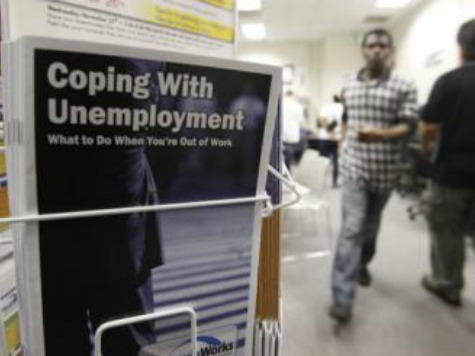The U.S. Department of Labor’s (DOL) annual financial report revealed that in 2013 it improperly paid an estimated $7.7 billion in taxpayer funds to Unemployment Insurance (UI) beneficiaries, including $7.3 billion worth of overpayments.
President Obama and some lawmakers are pushing for an extension of unemployment insurance benefits, which expired for many Americans at the end of year. The Senate is expected to take this issue up as its first legislative action upon returning from Christmas break.
According to the fiscal 2013 annual financial report the DOL released in mid-December, the estimated $7.7 billion in improper payments made through waste, fraud, and errors last year constitute an approximately 20 percent decrease when compared to the $9.7 billion in 2012. However, the report pointed out that the “true” improper payment rate, which refers to mistaken payments as a percentage of program outlays, increased from 10.8 percent in 2012 to 11.5 percent in 2013.
This means that 10.8 percent of the $90.2 billion spent on unemployment benefits in 2012 was paid by mistake, compared to 11.5 percent of the $66.7 billion spent on UI last year. More than $1 out of every $10 spent on UI recipients in 2013 was paid in error.
“For FY 2013, the Department reported improper payments totaling approximately $7.68 billion for the UI program alone,” stated the DOL finance report.
The majority of mistakenly spent funds on the unemployed in 2013 were overpayments; of the total $7.7 billion in unemployment payments considered improper last year, $7.3 billion were overpayments. The remaining $334 million were underpayments.
In 2013, DOL also made $5.8 million in improper payments through its Work Force Investment Act of 1988 (WIA) program, which doles out grants aimed at providing employment and training services, according to the DOL report.
The WIA program’s payment errors in 2013 decreased from $7.1 million the previous year. WIA erroneous payments brought the total amount of improper payments reported by DOL in 2013 to about $8.3 billion.
In 2013, DOL changed the way it calculates improper payments by subtracting overpayments recovered from total estimated overpayments. The issue with this formula is that overpayment recoveries in 2013 may include funds that were improperly appropriated during previous years.
“In 2013 the [Labor] Department, in conjunction with OMB, made a change in the way it computes the improper payment rate by subtracting overpayments recovered from total estimated overpayments,” the financial report states. “The true UI improper payment rate without netting out subsequent recoveries actually increased from 10.78 percent for the 2012 reporting period to 11.50 in 2013.”
Breitbart News primarily focused on what the DOL report referred to as “true” figures, those outside of the new implemented changes.
The new formula resulted in DOL lowering its 2013 estimate of unemployment payments made by mistake from $7.7 billion to $6.2 billion (including $5.9 billion in overpayments). The new formula also knocked the 2013 improper payment rate down to 9.3 percent from 11.5 percent.
In 2013, “the leading cause of UI overpayments is claimants who have returned to work and continue to claim UI benefits, and OIG [Office of the Inspector General] investigations continue to uncover fraud committed by individual UI recipients who do not report or under report earnings, as well as fraud related to fictitious employer schemes,” revealed the report.
Fraud was a root cause of improper payments in 2013, noted DOL. The report added:
The transition from in-person claims to remote claims processing (phone and internet) has depersonalized the process, making it easier for claimants to make false statements, and has had the additional side effect of precluding valuable prevention activities (such as agency messaging to reinforce eligibility requirements with claimants and questioning claimants with respect to their active work search efforts and benefit year employment issues) and contributed to the rise of improper payments.
DOL is taking steps to deal with improper payments.
“Between FY 2005 and FY 2012, DOL provided approximately $187.1 million to states in supplemental funding for integrity related projects,” mentioned the report. “Additionally, in FY 2011 $128 million in supplemental funding was provided to three consortia to address outdated IT system infrastructures, all of which are necessary to improve UI integrity. In FY 2012, an additional $92.8 million was awarded to these consortia.”
The WIA improper payments were blamed on “documentation and administration errors,” as well as “verification errors” in the report.
PaymentAccuracy.Gov claims that “the Federal-State Unemployment Insurance program helps cushion the impact of economic downturns and brings economic stability to communities, states, and the nation by providing temporary income support for laid off workers.”
That same website explained that an improper payment occurs when “funds go to the wrong recipient; the right recipient receives the incorrect amount of funds (including overpayments and underpayments); documentation is not available to support a payment; or the recipient uses funds in an improper manner.”
In his weekly address, President Obama argued that extending unemployment benefits will boost the economy. However, some economists believe that extending unemployment benefits fuels unemployment instead.
Overall, the federal government improperly paid a total of $106 billion in 2013, most of which was doled out by the U.S. Department of Health and Human Services.

COMMENTS
Please let us know if you're having issues with commenting.